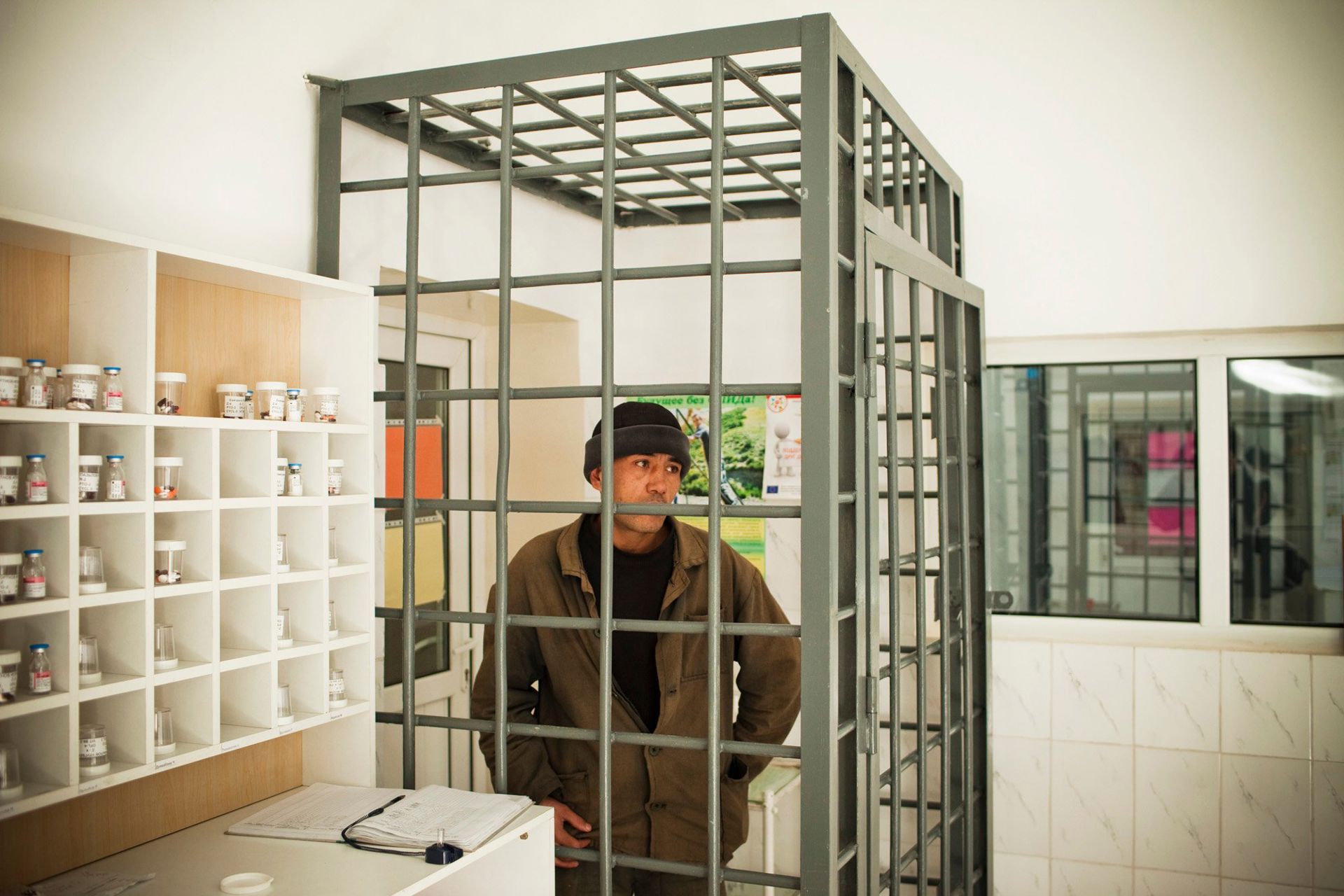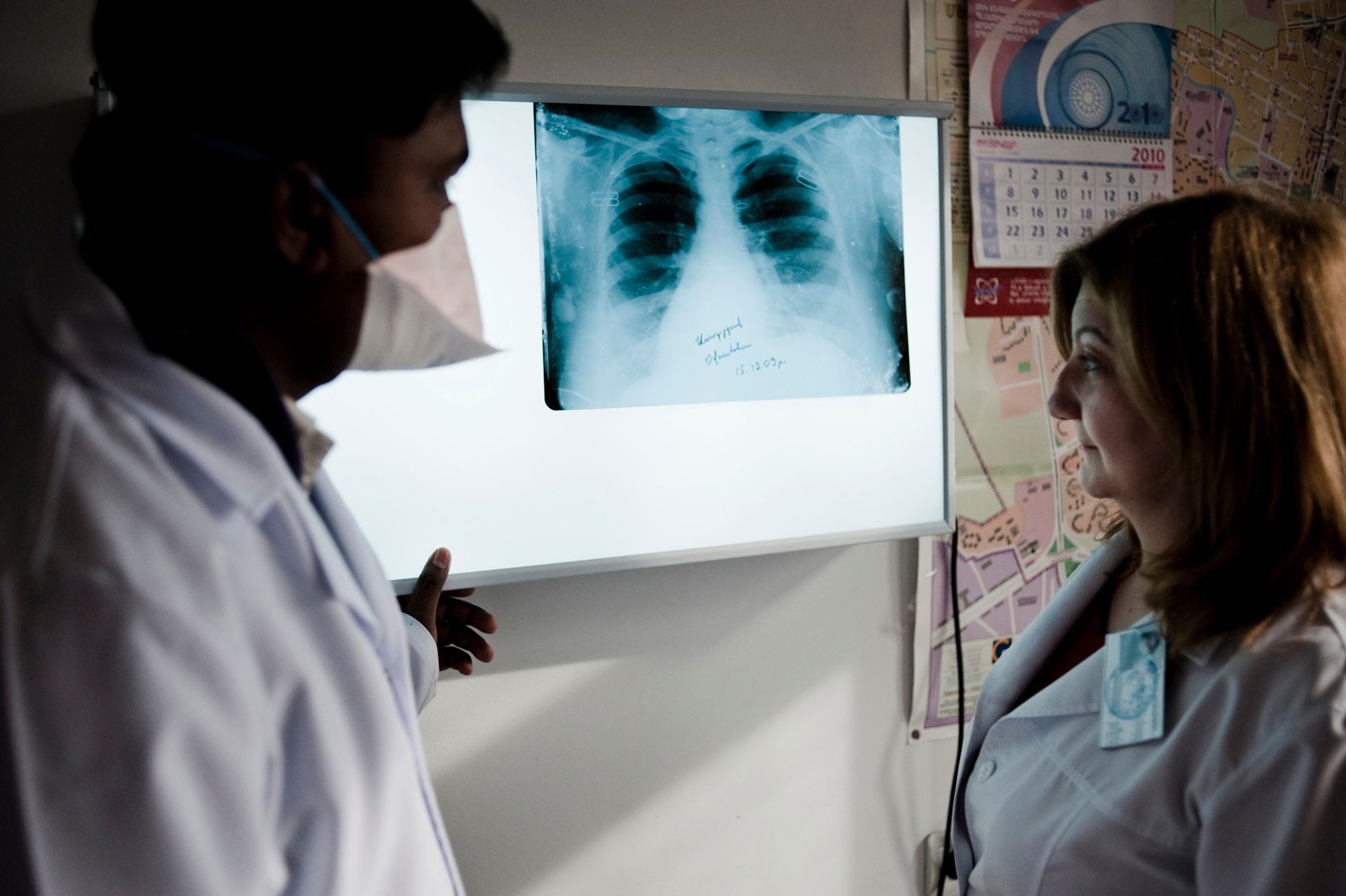At the end of the twentieth century, optimism prevailed. People said tuberculosis was on its way to being eradicated around the world. However, the disease, which in the past afflicted hundreds of thousands of “consumptives” in Europe with the most privileged seeking treatment in sanatoriums in the Alps, is coming back with a vengeance. From Swaziland to Kyrgyzstan, Médecins Sans Frontiéres (MSF/Doctors Without Borders) teams are fighting its resurgence.
Heaven on Earth. That’s the first impression of a visitor arriving at the New Haven clinic, one of 17 health centres overseen by MSF in the Shiselweni region of Swaziland. At the top of a verdant hill, the clinic is not far from the village, a few dozen houses, a church, and a school surrounded by fields and prairies. In the shadow of a large tree, three women sell colourful fruits and vegetables.
The heavenly scene is deceiving, however. Behind the clinic some 30 patients wait in line. Men, women, and children, all coming to renew their prescription for antiretroviral medicines or to be tested for tuberculosis (TB). Like most villages in Swaziland, New Haven is being ravaged by the double-edged sword of HIV/AIDS and TB. One adult in four here is seropositive and, more importantly, 80% of the thousands of people infected with TB each year also have HIV/AIDS.
"AIDS and tuberculosis have caused great sorrow in the community," remarks 62-year-old Sam SIMELANE, one of the few elders in the village. "Many people have died; many have lost their entire family."
In Swaziland, as in most countries in southern Africa, TB has become the leading cause of death for people with HIV/AIDS who have weakened immune defences. MSF has been intervening in Shiselweni Province since November 2007, helping to treat several thousand patients affected by HIV and/or TB. By the end of 2009, more than 2,700 TB patients were receiving treatment in centres overseen by MSF in Swaziland, including 105 patients with a drug-resistant form of the disease (DR-TB).
Tuberculosis Returns
At one time we thought TB was on its way to being eradicated. Yet the disease, which in the past afflicted hundreds of thousands of "consumptives" in Europe with the most privileged seeking treatment in sanatoriums in the Alps, is coming back with a vengeance. Today the main hotbeds of its resurgence are southern Africa, southeast Asia, and central Asia, three regions where MSF teams are operating and are treating TB patients.
MSF works in Swaziland and Kyrgyzstan, where it treats patients with the disease, but its field workers also care for TB patients in many other countries from Myanmar and Djibouti to Mozambique. While in Swaziland the combination of HIV and TB is taking a terrible toll, in Kyrgyzstan hundreds of TB patients are concentrated in the prisons: TB prevalence among prisoners is 20 to 30 times greater than in the rest of the population. MSF has been intervening since 2006 in two Kyrgyz penitentiaries where more than 1,700 prisoners were since then diagnosed and treated for the disease.
Following an anti-tuberculosis treatment is very restrictive—even more so when it is a form of the disease that is resistant to certain medicines, which is more and more frequent. In additional to medical follow-up, MSF ensures that its patients can receive their treatment in the best conditions. In Swaziland, as in Mozambique, MSF has trained “expert patients” who help other patients correctly follow their treatment through to the end. In Kyrgyzstan a team of MSF social workers and a network of volunteers bring aid to approximately 70 former patients who are ex-prisoners, so they can finish their treatment against the disease. The assistance includes advice, information, and training as well as food and money for transportation.
Umutai DAULETOVA, an MSF social coordinator in Kyrgyzstan, explains that it can be difficult for former prisoners with TB to be admitted to public hospitals. "Our patients are stigmatized in their community not only because they have TB, but also because they were in prison. Some of them are homeless, jobless, alcoholics, drug addicts, and even undocumented. We’re now trying to implement a case management system, a communal approach that volunteers can use to help patients adhere to their treatment."
Resistance
The return of TB to the painful honour roll of global epidemics is accompanied by an even more worrisome phenomenon: the emergence of forms of the disease that are resistant to standard treatment (MDR-TB). These treatments, antibiotics discovered during the mid-twentieth century, are no longer effective and, when confronted with the resistances developed by some patients, health workers must prescribe a much longer and more difficult treatment. Moreover, recovery is not always guaranteed. "These patients receive injections every day for an average of six months, and their treatment, which is based on multiple tablets, can last up to three years with numerous side effects," explains Dr. Hermann Reuter, an MSF field worker in Swaziland. These side effects range from unpleasant to unbearable, or even dangerous. Several TB medicines have horrible gastric effects, causing sudden nausea, and may lead to dysfunctions in the kidneys and liver. The only way to fight these side effects is to take even more medicines in addition to the already extremely high number of daily pills.
"It was a nightmare. You can’t even imagine how hard it was to take the medicines," says Ruslan, a former Kyrgyz prisoner who was cured of his MDR-TB by MSF. "You want to sleep, but you can’t. You’re tired, you have heartburn….you vomit, but you don’t feel better. I took the medicines even if I was at my worst, but my former cell mate couldn’t continue. The side effects were unbearable for him."
Every year 120,000 people around the world die from MDR-TB, while nearly a half-million new cases are identified. Among those, 97.5% do not have access to an appropriate diagnosis or treatment and must live from day to day with this infectious and potentially deadly disease. The number of patients with forms of drug-resistant TB is climbing. Most patients contract MDR-TB because they are not properly treated. However, more and more people are first infected with a resistant strain of the disease.
Faced with the threat of the worldwide resurgence of the epidemic and its malicious alliance with HIV/AIDS in certain regions, MSF can not just treat patients. The organisation also acts so that the disease can be treated more easily and more quickly. “We’re fighting on several fronts in our discussions with governments, the WHO, and pharmaceutical laboratories,” asserts Dr. Frauke JOCHIMS, a referent doctor for TB at MSF headquarters in Geneva. "On the one hand, better tools for detecting and diagnosing TB need to be developed, especially for resistant forms of the disease. On the other, it’s clear that current antibiotics are both ineffective and the cause of unbearable side effects for patients. We need new treatments and quickly, medicines that are effective and affordable for developing countries."
In Djibouti, for example, many of the malnourished children being treated at MSF’s therapeutic nutrition centre also suffer from TB. Children are the most neglected among TB victims because, at present, we do not have diagnostic tools that suit their needs. MSF is insisting that laboratories develop formulas suitable for children.
The fight against TB should, unfortunately, remain a priority for MSF field workers in the field in coming years.



